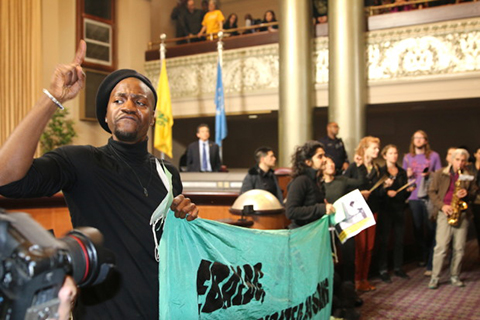Feature Archives
Sun Mar 20 2016 (Updated 04/18/16)
Community Call for "Public Land for Public Good" Ignored by Oakland City Council
On March 15, the Oakland City Council approved moving forward with the latest iteration of luxury housing at the E12th Street parcel, public land that was created when the roads and bridges around the south end of Lake Merritt were recently reconfigured. Housing activists showed up at City Hall and successfully shut down the meeting, but the council then held their discussion and vote privately in Mayor Libby Schaaf's office. Critics vow to keep the fight alive for "public land for public good." A final vote on the proposed sale to UrbanCore will happen later this year.
Sun Mar 13 2016 (Updated 03/16/16)
Santa Cruz City Council Votes Down Change to Sleeping Ban Law
On March 8, the Santa Cruz city council voted 5-2 to oppose an amendment to municipal code 6.36.010, also known as the camping ban. The proposed amendment would have removed references to sleeping and covering up with a blanket from the text of the law, as well as removing references to sleeping in cars. Effectively, these changes would have made it legal for people sleeping outdoors to do so without fear of citation by police.
Sun Mar 13 2016 (Updated 03/14/16)
Protect Monterey County Takes Another Step Towards Fracking Ban
On February 23, Protect Monterey County gathered at the steps of the old court house in Salinas to announce the delivery of their notice of intent to circulate the petition: "Protect Our Water: Ban Fracking and Limit Risky Oil Operations Initiative." The group is now seeking signature gathering help to put the anti-fracking Initiative on the ballot in Monterey County for November 2016.
Sun Mar 13 2016
Capitola City Council Member Mike Termini Thumbs Nose at Residents of Library Service Area
Bruce Holloway writes: In his statement of economic interests upon leaving office as library board chair, Capitola City Council Member Mike Termini failed to disclose the true percentage of his ownership interest in Triad Electric, Inc., a local electrical contractor. He also failed to disclose $17,000 worth of business Triad Electric did last September for NHS Inc., a local skateboard manufacturer. That's roughly equal to two years worth of rent that Santa Cruz Council Member Micah Posner omitted on his disclosure forms.
Sun Feb 21 2016 (Updated 05/03/16)
Anti-BDS Bills Introduced in California Legislature
Israel’s defenders in the U.S. have intensified their efforts to stifle criticism of Israeli government policies with new bills and laws seeking to censor or punish advocacy in support of Palestinian rights. In California, two anti-BDS bills were introduced by Assembly member Travis Allen. AB 1551, the “California Israel Commerce Protection Act”, would prohibit the state from investing in businesses and institutions that comply with boycotts against Israel or Israeli-controlled territories. AB 1552 would prohibit the state from contracting with entities that engage in what he calls “boycotts due to discrimination and bigotry.”
With the hope of nudging the city forward toward making good on its months-old public promise to initiate permanent investment in the Beach Flats Community Garden, and under imminent threat of legal proceedings against them, on February 16 the gardeners of Beach Flats decided to sign a city letter acquiescing to temporarily leaving the garden plots they have tended so carefully over the past two decades.
Thu Feb 11 2016 (Updated 02/20/16)
Hundreds March for Beach Flats Community Garden
On February 9, hundreds of people marched through downtown Santa Cruz from the Beach Flats Community Garden to the City Council meeting. Gardeners, along with a large coalition of supporters, are seeking a creative solution to preserve twenty five years of cultivating food and culture in the heart of the Beach Flats.








